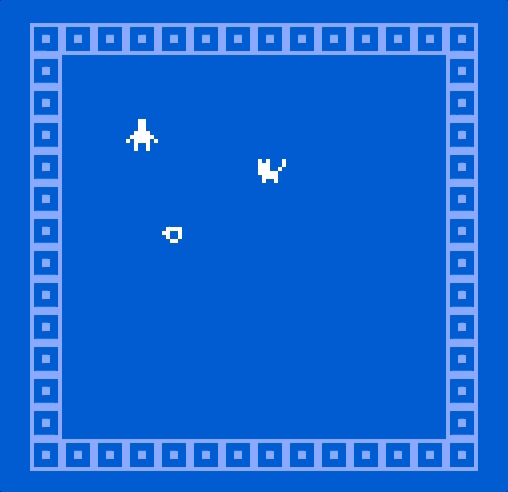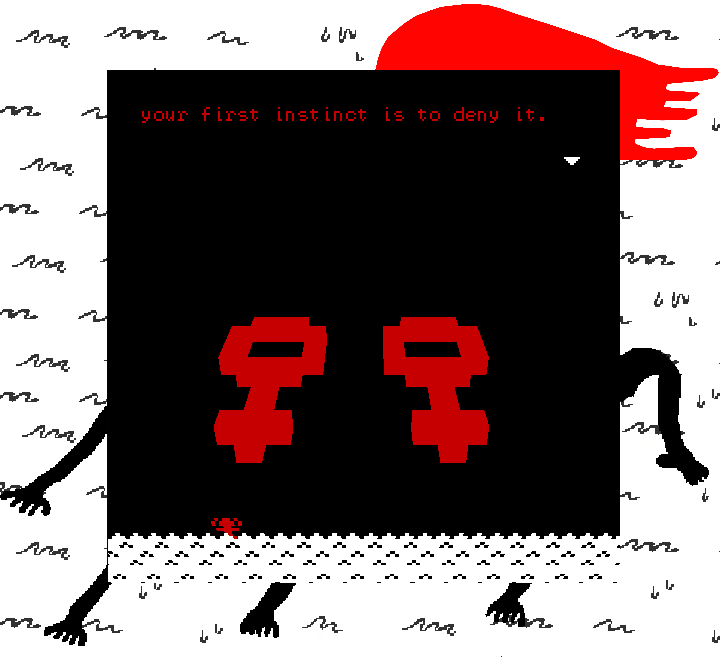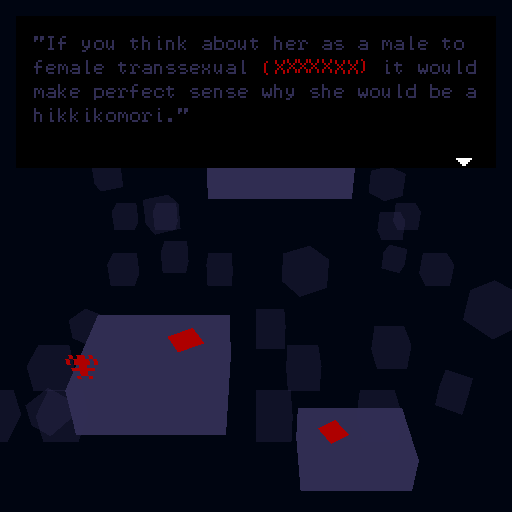This post is all about Bitsy!

I vividly remember the very first Bitsy game that I played. I don’t remember who it was by, or how to find it again… it’s lost in the sea of Bitsy games that came out since. I almost brushed it off because, judging by the first impression, Bitsy looks so easy to not think much of.
In a space like itch.io that is inundated with thousands of really great indie games, all with some pretty great and complicated visual styles, why even try it?
On the other hand Bitsy runs in the browser so why not…
I was engrossed by the space I found my tiny avatar in… a beach with a metaphoric two color ocean, everything decorated with glitchy icons… strange textures open to interpretation. I walked away from the water and found myself in a beautiful glitching field, with trees just up ahead. Things pulsating with a limited range of animated frames. Walking further up, the author changed the perspective so the space behaved as if I was looking from the side, like a platformer, with a beautiful low-fi view of something… a sky… cliffs? The texturing was so complex. The pixels arranged to make these striking patterns, columns, reaching up. It looked like digital ruins.
Even with just two colors, the space communicated strongly. The writing came across so meaningfully for all that.
I loved it and played it a few times through, taking in this really different way that an environment can be evocative… then I moved on.
I can’t find the game again. This was years ago, and Bitsy games have become a mass on itch.io. There are so many Bitsy games out there.
I still think of it sometimes…
For those that don’t know, Bitsy is a game editor for creating tiny stories, words, spaces… I think a good way of describing these games sometimes is to view them as folk tales. They’re not high brow. They don’t have any big budget (by nature they can’t even be that), no frills, no large teams, no way of making a lot of money from them… But they’re easy to share. They’re everywhere and really meaningful to people.
Bitsy is as much about community as it is a game development tool.
Bitsy is iconic for its limited color scheme, and extremely restrained visuals.
Despite the restrictions, people have found ways to make some fairly complicated art in it, even expanding on it to allow things like 3D spaces.
The tool is inspiring to look at for how accessible it is, open, welcoming…
Since its inception, Bitsy has grown a lot, with a thriving community around it.
I think it’s amazing that something so simple, so easy to brush off or overlook, grew to be such an important cornerstone in indiegames. I think it’s fair to say that. It’s not an exaggeration.
Even the Playdate has taken inspiration from the Bitsy editor (or outright copied it, depending on what side of Twitter discourse you’re coming from).
All that said, Bitsy is irreplaceable.
I think a big part of the appeal is how egalitarian it is. A Bitsy game will look like a Bitsy game no mater how advanced of a developer uses it. There’s no room to invalidate people’s work as amateurish because, by definition, it exists just to make small things in it.
It creates space for people to just make something, while allowing for some very impressive art to grow out of its constraints… many developers even find their own voice with it. It’s beautiful to see people say that they got into game development because of Bitsy!
Bitsy is an amazing thing to pick apart and analyze. To me, it reflects all the best qualities of the indie game community. It’s welcoming, inclusive, and gives voice to people.
There are even indie developers who make games only in Bitsy. I don’t think I exaggerate when I say that Bitsy is a big deal to many people.
I can’t imagine games without Bitsy anymore.
One thing I think the game space can learn from Bitsy is to never underestimate the importance of small tools. The tools that area easy (too easy even), that anyone can approach and just jam something out in.
Overall the tool space on itch is thriving and constantly growing. The Fantasy Console is a legitimate movement in many ways… All these small, open source, freeware tools that let you build a game in, or make sound effects, throw together a simple song, write a visual novel… there are so many of them.
It might be easy to brush them off, but they are a growing force nonetheless.
What I think is most striking about that space is that you could make a game entirely out of the free tools you find.
Try making the art in Wobble Paint, maybe distort it a little with PhotoMosh, and the music in Lovely Composer, and use Tuesday JS to build the game. You’ll have something solid assembled from all these little bits and pieces.
To me that’s inspiring because it shows just how accessible creating this stuff is.
I’ve played many Bitsy games over the years. I still think about some of them long after. Regretfully I never saved the links to them. It’s Bitsy! It’s so easy to underestimate what they start meaning to you.

Novena by Cecile Richard is one of those haunting Bitsy games. It’s a beautiful atmospheric poem about the ocean.
What I think is interesting about it is how open to interpretation it is. It also illustrates so well how strongly writing comes across in Bitsy.
It’s visually complex for how it uses the restraints of the platform.
Novena opens up in a pixelated altar space. Lightbeams coming through the windows, and what look like candles flickering around a bird avatar that you control.
As you interact, a poem about the ocean starts to be told to you. I love the direction it takes after that because it manages to find these really consistent and interesting ways to tell this deeply impactful poem using repetition. The overall piece (the interaction) is like a poem in itself, not just the writing.
My favorite part is when it lets you walk past the days of the week. At first you assume the line is a door, or some other illustration of something… then you realize that it’s numerals. The poem draws on the passage of time in the writing, and also how it illustrates that.
It’s simplistic, but it knows what to focus on. It’s really powerful for all that.
There’s a lot you could interpret this as. A poem about the ocean, forgiveness, finding common ground, letting go, coming to terms with… It’s what makes Bitsy so special.
Maybe if this were made in Unity, with fancy graphics, it could communicate just as strongly. I don’t really think so. I think the point comes across because of how the simplicity of Bitsy encourages you to focus on what’s important.
I grew up with low-fi two color games that you played on floppy discs (when they were still floppy). The text adventures that drew on writing as the main way to capture your attention were always the most fascinating to me. Many of these games let you control an avatar that was basically just a single unicode character (often the one that looked like a face). Games were restrained by the platform, but people still managed to tell these stories on them.
When things got more visually complex, I remember how much I would miss the trend of not having much in terms of graphics. I missed how these games let your imagination participate.
Some might look at Chopper Commando and see a really ugly, interpretive space, that weird two color explosions happen in. When I played it, my imagination filled in the gaps. I made up stories about what happened to the commando while I was playing it.
I guess you can say it’s a lot like when kids play with toys, and come up with these fantastic worlds surrounding an activity like flying around a tiny plastic airplane. To me, these games were more like toys. My imagination could participate.
Today, most games are very literal in terms of the environments that you are put in. Things are very explicit. A car really looks like a car. You drive around in the car, in a city that is explicitly a city. There’s no need for interpretation (unless it’s an indie art game).
As great as that is, I think there’s still something valuable about restraint. Platforms, tools, art, that allows for interpretation because of the self-imposed restrictions.
Bitsy games remind me of that. Their environments can be just as emotionally evocative for how they let you interpret everything.

For example, There Aren’t Really Words… by rose.kiid (CW: suicide, grief) is a Bitsy about receiving the worst news possible. The loss of a loved one.
It is incredibly moving, and difficult to play for what it is about.
It’s small and a perfectly bundled type of storytelling that puts you in an emotional space. It’s kind of about the transformative quality of grief because of how the world changes after.
It’s really powerful for it’s simplicity. There’s nothing to distract from what it’s about. The focus is on you receiving this news, and you are coping along with the author.
The game starts in a simple space depicting a home. You’re done with schoolwork and should do the dishes. You go round them up. It’s a basic little pattern that you’re tasked to do, creating the sense of this being a pretty innocent sweet space. You learn the space too as you are exploring it for dishes.
At some point your phone rings and you receive the terrible news. This is when the simple and happy home changes. Glitch and distortion is everywhere. The space is kind of scarred.
The change is what communicates the point so heartbreakingly well. These terrible things change your outlook. That space you were in is different. There’s no room for peace.
Despite its visual simplicity, it’s another example of a Bitsy that makes you feel very difficult things.
“There Aren’t Really Words…” is the author’s first game. It’s also the only game on their itch.io page. I truly treasure this. It’s something someone made to express something, put it out there, and you maybe find it. If you do, you experience a moment in someone’s life. A difficult one, but one that so many can relate to.

The Loneliest Astronaut by AQUANAUTS HOLIDAY is one that I played in 2019 and still thought back to every once in a while. It’s a pointed vignette about loneliness, the desire of solitude, and then the terror of being alone. You’re an astronaut in space, the only human on your ship. The Bitsy takes you through these moments in their life until a point where the decision to be alone catches up. The way the game conveys this, in the end, is particularly impactful.
It’s a pointed metaphor that ends up being very personal and relatable.
I loved this one for all the layers of meaning in it. Again, the simplicity makes it so much easier to engage with too.

CLINT IS NOT AN INCEL: A WORD ON FATNESS AND MASCULINITY by ianmart1n is a Bitsy about Clint from Stardew Valley. It unpacks a lot of things that I don’t think I could do justice to by writing about here… like our cultural tendencies to view some more “romanceable” than others, and the rhetoric around that…
At the first screen, to unpack the opening statement, you collect these knives. Each knife has a bit of dialogue attached to it that further elaborates. I think using knives as an icon is a meaningful decision. It establishes itself as “death by a million cuts”.
There’s a strong theme of body image in video games that I really wish we talked about more.
It reminds me of Todd Harper’s GDC talk on “Portrayals and Pitfalls of Fatness in Games” from 2015 (you can watch it for free on the vault and you really should).
CLINT IS NOT AN INCEL: A WORD ON FATNESS AND MASCULINITY absolutely goes there, talking about how “fatness” gets associated with “ugliness” gets associated with being a creep, and how video games play into that… There’s a lot to this one. I don’t want to misrepresent it by saying more.
It’s a personal vignette and social commentary that’s very worth reflecting on.

There are a lot of Bitsy games that are social commentary. I think it’s a beautiful thing to be able to play through a game and come away with complicated feelings about society. Bitsy is a space that shows how much politics belong in games, in meaningful and mature ways.
Guerrilla Gardener by PIGEON GIRL is an interesting one that’s a lot like an essay illustrated as a Bitsy. You walk around, and discover facts about food, inequality, and the importance of community run gardens. Along with the rich amount of information that you collect, you are tasked with cleaning up a space for a community garden.
I love the combination of using Bitsy as a way to illustrate the points being made, and how you participate by planting. It’s meaningful social commentary that you need in your life!

A Hideo Kojima Game (Not actually a Hideo Kojima game) by TT is another interesting one. It’s very short, one space, and sarcastic.
“Be Hideo Kojima and create a Hideo Kojima game.
A game not made by Hideo Kojima, which means the declaration of not Hideo Kojima doing concept, produce, original story, script, setting, game design, casting, dealing, directing, difficulty adjustments, promoting, visual design, editing, supervising the merch.”
I liked it. It made me laugh.

Saving the best for last… (I’ll be mad at you if you don’t play it)
madotsuki’s closet by Bagenzo blew my mind. Simply put. I don’t even know where to start describing it.
I think maybe… if you liked my game “Everything is going to be OK” then you really should try this one. It’s meaningful, complex, emotional, uses all these unusual modes of communication, and you have this singular thing in the end that couldn’t come from anyone else but the person that made it.
madotsuki’s closet is an essay about Yume Nikki and trans identities.
I find this so interesting because it starts out as this super informative essay about the game Yume Nikki, discussing some of the fan culture that surrounded it, fan theories about it, then it breaks from that to talk about gender identity, and then it becomes this really personal autobiographical piece about being trans.
I couldn’t recommend it enough. I love the idea of using fan culture surrounding something as a jumping board into more complicated things. It does that with so much integrity too. Like, I would cringe if you called this a fan game. It’s so much more than that.
It’s the type of critical writing that I would expect from the most seasoned game critics out there. I think it’s fascinating that the author managed to take that type of writing and turn it into a game.
The way it was turned into a game too is what makes it so impactful. You explore the writing in these Bitsy spaces. It’s 3D too. The contexts, perspectives, spaces… keep changing. It’s a lot like Yume Nikki for how it switches up. Toward the end it introduces a chat window where you read the authors experience from chatting with friends.
There’s so much to it. I think it’s a beautiful achievement.

Earlier in this post I mentioned that the free (open source, freeware, small developer) tool space on itch.io is so inspiring because people can make games using just these tools. There’s no need (requirement is probably a better word) for something like Unity to make a good emotionally powerful game.
I think “madotsuki’s closet” illustrates that.
The way it is structured is really interesting. It’s browser based. You explore this series of Bitsy and Twine games. The way it switches between these varying contexts is what makes it such an interesting experience.
It’s singular. You have to try it!
So, after reading all this, I hope that you will give Bitsy a try and make something!
I think Bitsy really deserves to be talked about more. The games made in it deserve much more recognition.
The community is wonderful, diverse, talented… the space is truly one to appreciate.
Other Bitsy’s…
The House of the Living by Fred Bednarski
“A sinister mansion calls to you, will you discover its secrets? Play in browser; 5-10min, use arrows keys to walk. Walk into characters and objects to interact with them.”
“Enbies flirting in mechs in the afternoon”
Devil’s train by Tizis
A bitsy music video!
“A brief vignette about what my teenage self got up to after midnight.”
I have a theory that if you make 3D environments, maybe you could plan them out in Bitsy and it could be a great addition to your workflow!
Karl Marx Reads You The Communist Manifesto by Communist Sister Ineractive
“The history of all hitherto existing society is the history of class struggles. Let Marx tell you more, in glorious pixel quality.”
3 Responses
[…] Lawhead wrote about their favorite Bitsy video games. I’m consistently amazed by […]
[…] Lawhead wrote about their favourite Bitsy games. I’m consistently amazed by […]
[…] Lawhead wrote about their favourite Bitsy games. I am constantly amazed by […]